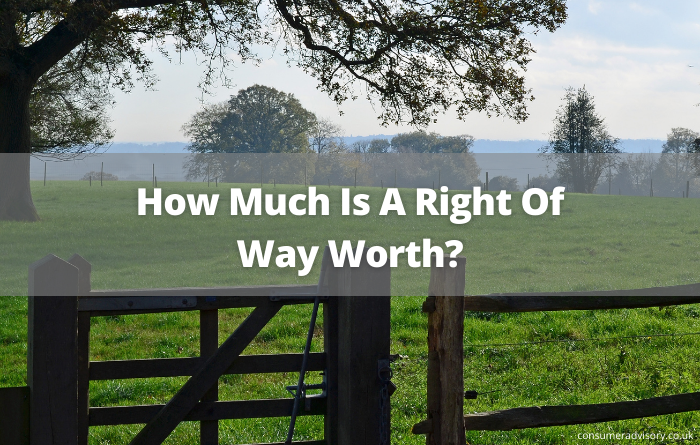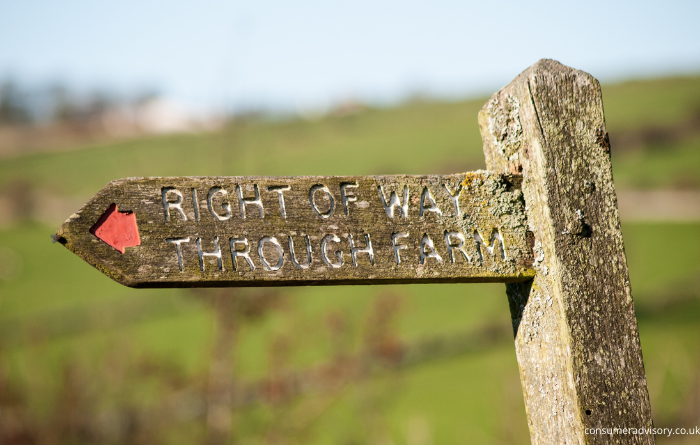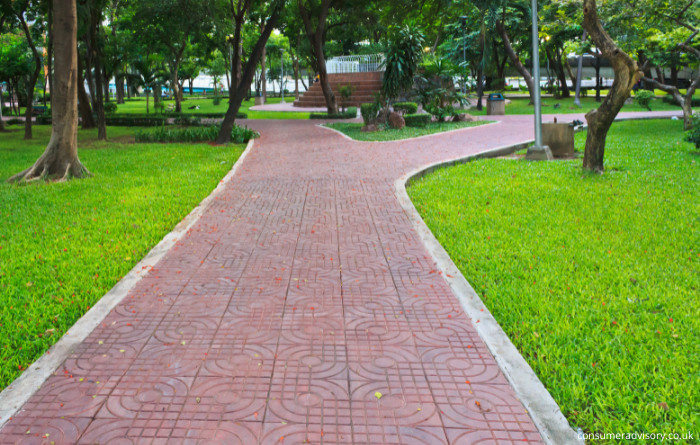
How much is a right of way worth? There is no official price on a right of way in the UK. This means that landowners can set their own prices when it comes to selling a right of way. They could charge as little as £1, or as much as £1,000,000 – the right of way is worth as much as the landowner decides to charge and as much as someone is willing to pay.
In this article, we’ll tell you everything you need to know about the value of a right of way, from how you go about valuing the right of way to how much the right of way could devalue a property.
When it comes to valuing a right of way, there are a few things you need to take into account. The first is the size of the right of way – how much land does it cover? The second is the location of the right of way – is it in a rural or urban area? And finally, what is the use of the right of way – is it a footpath or a bridleway, part of a garden or a service road?
The size of the right of way is going to be the biggest factor in its value. A larger right of way is going to be worth more than a smaller one. This is because a larger right of way covers more land, which means that there is more potential for it to be used.
The location of the right of way is also going to affect its value. If the right of way is in a rural area, it is likely to be worth less than if it were in an urban area. This is because there is less potential for the right of way to be used in a rural area. There are fewer people and fewer houses, which means that there is less need for a right of way.
The use of the right of way is also going to affect its value. If the right of way is a footpath, it is likely to be worth less than if it were part of a garden. This is because giving right of way over a garden causes much more inconvenience to the landowner than a footpath.
A right of way is a legal agreement that allows people to access a piece of land. It can be used for a variety of purposes, such as walking, cycling or driving.
A right of way can be created in several ways. The most common way is by an agreement between the landowners. This happens when one landowner gives a person or a group of people the right to pass through their land for access. The landowner may request a fee for granting the right of access.
It’s important to note that having a right of way over your property can cause it to devalue. This is because the right of way can be seen as a negative by potential buyers. It’s important to take this into account when you’re considering selling a right of way over your property, especially if you plan to sell your property in the future.
How much your property will be devalued by a right of way will depend on the size of the access and its location. If the public have right of way over your garden, you’ll find that your property may be significantly devalued by this right of way. However, if the right of way is a small footpath that crosses your property boundary, it is likely to have less of an impact on the value of your property.
It’s important to remember that a right of way is a valuable asset, and one that landowners can charge for. If you’re thinking about selling a right of way over your property, make sure to get a valuation from a property expert to find out how much the right of way is worth.

It is possible to buy a right of way, but it’s not always easy. The process of buying a right of way is known as an easement.
If you’re interested in buying a right of way, the best place to start is by contacting the landowner. The landowner will be able to tell you if they are interested in selling the right of way and how much they are asking for it.
It is possible to remove a right of way, but it’s not always easy. The process of removing a right of way is known as an extinguishment.
The easiest way to remove a right of way is with the consent of the user. If the right of way is granted only to a specific user and you have their consent to remove their right of way, you will be able to seek removal of the rights with the help of a solicitor. You will need to create a Deed of Release to remove the rights formally.
If your reason for removing the right of way is due to lack of use, this can be more complicated. You will need to demonstrate that the reason for the right of way no longer exists, for example access to a facility that is no longer in place. You will also need to prove that the people that benefitted from the right of way have agreed that they no longer require the access.
In some cases, a neighbour may have right of way through your garden. This is often the case in terraced properties, where the mid-terrace cannot access their own garden from the front of their property.
If your neighbour has a right of way through your garden, this will be written into the deeds of your property. You will need to check your deeds to see if this is the case. If you’re still unsure, it’s best to contact a solicitor who can help you to understand your deeds and give you advice on your situation.
It is not legal to lock a gate on a right of way, as this would prevent the public from using the right of way. If you have a gate on your right of way, you must keep it unlocked at all times. Alternatively, if the right of way is only granted to one individual, you can give that person a key to the gate, so that they can still access the right of way.

A right of way must be left accessible at all times. This means that you cannot block a right of way at any time. If work needs to be carried out on the right of way which will affect access, users should be given adequate notice of the works before commencement.
A right of way is a legal right, providing it is written into the deeds of the property. This means that if you block the right of way, the other party could take legal action against you.
It’s best to try and solve this issue informally first, through a conversation with your neighbours. However, if the issue cannot be resolved in this way, a solicitor may be required to step in to resolve the issue. This could lead to neighbours going to court to dispute the right of way.
A right of way will continue to exist until it is removed from the deeds of the property. If a right of way is not used, it does not mean that it will be automatically removed. However, the right of way may be contested if it is not used for a number of years.
The owner of the property where the right of way is located is responsible for maintaining the right of way. This includes keeping the area clear and safe, so that people can use the right of way without any issues.
If you have a right of way over someone else’s property, it’s important to be aware that you do not own the property. This means that you cannot make any changes to the property, or carry out any work without the permission of the owner.
Yes, if you own the property where the right of way is located, you are responsible for maintaining it. This includes keeping the area clear and safe, so that people can use the right of way without any issues.
If you are a tenant, it is your landlord’s responsibility to maintain the right of way. If you are the owner of the property where the right of way is located, and you do not want to maintain it yourself, you can hire a contractor to do this for you.
If you are a neighbour with a right of way over someone else’s property, it is your responsibility to maintain the right of way. This includes keeping the area clear and safe, so that people can use the right of way without any issues.
It is not usually possible to build on a right of way, as this would prevent people from using the right of way. If you’re unsure, it’s best to seek legal advice to find out what is and isn’t allowed.
A right of way is a legal right which allows people to access a property. The owner of the property where the right of way is located is responsible for maintaining it. If you have a right of way over someone else’s property, you are responsible for maintaining it. It is not usually possible to build on a right of way.
In this article, we have answered the question ‘how much is a right of way worth?’, as well as exploring right of ways in more detail.
Copyright © 2025 Consumer Advisory. All rights reserved.